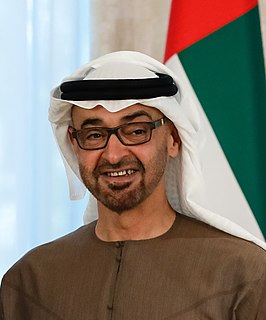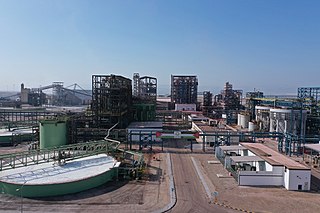
In chemistry, a phosphate is an anion, salt, functional group or ester derived from a phosphoric acid. It most commonly means orthophosphate, a derivative of orthophosphoric acid H
3PO
4.
Banu Kanz was a semi-nomadic Muslim dynasty of mixed Arab–Beja ancestry that ruled the border region between Upper Egypt and Nubia between the 10th and 15th centuries. They were descended from the sons of sheikhs of the Arab Banu Rabi'ah tribe and princesses of the Beja Hadariba tribe. They gained official control over the region of Aswan, Wadi Allaqi and the frontier zone in the early 11th century when their chief, Abu al-Makarim Hibatallah, captured a major rebel on behalf of the Fatimid authorities. Abu al-Makarim was accorded the title Kanz al-Dawla by Caliph al-Hakim and his successors inherited the title. The Banu Kanz entered into conflict with the Ayyubids in 1174, during which they were defeated and forced to migrate southward into northern Nubia, where they helped accelerate the expansion of Islam in the mostly Christian region. They eventually assumed control of the Nubian Kingdom of Makuria in the early 14th century, but by the early the 15th century, they were supplanted by the Hawwara tribesmen dispatched by the Mamluks to combat the Banu Kanz. Their modern-day descendants are a Sudanese tribe known as the "Kunuz", who live in the far north of the country.

Sheikh Mohamed bin Zayed bin Sultan Al Nahyan, colloquially known by his initials as MBZ, is the third president of the United Arab Emirates (UAE) and the ruler of Abu Dhabi. He is seen as the driving force behind the UAE's interventionist foreign policy and is a leader of a campaign against Islamist movements in the Arab world.

The OCP Group is a Moroccan state-owned phosphate rock miner, phosphoric acid manufacturer and fertilizer producer. Founded in 1920, the company has grown the world's largest "supermajors" producers of phosphate and phosphate-based products and it is one of the largest phosphate, fertilizer, Chemicals and Mineral industrial companies in the world by revenue.

The Islamic State (IS), also known as the Islamic State of Iraq and the Levant, Islamic State of Iraq and Syria, and by its Arabic acronym Daesh, is a militant Islamist group and former unrecognized quasi-state that follows the Salafi jihadist branch of Sunni Islam. It was founded by Abu Musab al-Zarqawi in 1999 and gained global prominence in 2014, when it drove Iraqi security forces out of key cities during the Anbar campaign, which was followed by its capture of Mosul and the Sinjar massacre.

The Arab Potash Company (APC) is a company that is primarily involved in harvesting minerals from the Dead Sea. It is the eighth largest potash producer worldwide by volume of production and the sole Arab producer of potash. The company was formed in 1956 in the Hashemite Kingdom of Jordan as a pan-Arab business venture and it has a 100-year concession (1958-2058) from the government of Jordan that grants it exclusive rights to extract, manufacture and market minerals from the Dead Sea. It is headquartered in Amman and has its main plants at Ghor Al Safi. The company's stock is listed on the Amman Stock Exchange's ASE Weighted Index.

Ismaily Sporting Club is an Egyptian professional football club, established on 20 March 1921 as El Nahda Sporting Club, based in Ismaïlia, Egypt. The club is best known for its football team. Also it's considered as an Egyptian National Club, where they helped the famous local tour of duty to play for the benefit of the homeland against the occupying armies. The club's nickname The Brazilians, is a reference to their uniforms, which echo those of the Brazil national team, and similar style of play.

Muhammad Abd Al-Halim Abu-Ghazala was Defense Minister of Egypt from 1981 to 1989. Abu Ghazala was seated next to Anwar Sadat when the president was assassinated.

Ahmed Mohamed Ahmed El-Tayeb is an Egyptian Islamic scholar and the current Grand Imam of al-Azhar and former president of al-Azhar University. He was appointed by the Egyptian President, Hosni Mubarak, following the death of Mohamed Sayed Tantawy in 2010. He is from Kurna, Luxor Governorate in Upper Egypt, and he belongs to a Sunni Muslim family.
Abdullah Mohammad Ali Abu Zema is a Jordanian professional football coach and former player.
The Sandpiper mine is a Namibian mine located off the coast of the harbour town of Walvis Bay. Sandpiper represents one of the largest phosphate reserves in Namibia, having estimated reserves of 1.82 billion tonnes of ore grading 19.5% P2O5. Although phosphate mining is controversial in Namibia because of its potential impact on the fishing industry, the mining license was granted in 2011.
The Abu Dabab mine is a large proposed mine located in the eastern part of Egypt in Red Sea Governorate. Abu Dabab represents one of the largest tantalum reserves in Egypt having estimated reserves of 39.9 million tonnes of ore grading 0.025% tantalum.

The Islamic State of Iraq, commonly referred to as al-Qaeda in Iraq, was a militant Salafist jihadist group that aimed to establish an Islamic state in Sunni, Arab-majority areas of Iraq during the Iraq War and later in Syria during the Syrian Civil War.

The mining industry of Sudan was mostly driven by extraction fuel minerals, with petroleum accounting for a substantial contribution to the country's economy, until the autonomous region of Southern Sudan became an independent country in July 2011. Gold, iron ore, and base metals are mined in the Hassai Gold Mine. Chromite is another important mineral extracted from the Ingessana Hills. Other minerals extracted are gypsum, salt, and cement. Phosphate is found in Mount Kuoun and Mount Lauro in eastern Nuba. Reserves of zinc, lead, aluminium, cobalt, nickel in the form of block sulfides, and uranium are also established. Large reserves of iron ore have been established.

The Islamic State – Sinai Province is a branch of the militant Islamist group Islamic State that is active in the Sinai Peninsula of Egypt.

Al Marmoom Desert Conservation Reserve is the first unfenced nature conservation reserve in the United Arab Emirates. It is located in the desert area of Saih Al Salam in the emirate of Dubai and comprises some 10% of the total land area of the emirate, including the extensive man-made desert wetlands, Al Qudra Lakes.
The 2022 Abu Dhabi attack was a terrorist attack against three oil tanker trucks and an under construction airport extension infrastructure in Abu Dhabi, United Arab Emirates conducted by the Houthi movement using drones, ballistic missiles and cruise missiles. The attack was called "Operation Hurricane of Yemen" by the Houthis. Although several missiles and drones were intercepted, 3 civilians were killed and 6 were injured by a drone attack.












